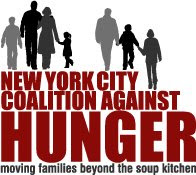
With economic downturn comes hunger, and with hunger comes obesity. Though this equation seems to counter the traditional logic of dieting, for families trying to survive on food stamps, buying low-cost high calorie-food is often the only solution for making limited allotments last into the second or third week of the month, prompting a cycle of serious weight gain. The U.S. Department of Health and Human Services found that women in poverty were 50% more likely to be obese than women of higher economic status, while a 2006
University of Pennsylvania study found that poor 15 to 17 year olds were also 50% more likely to be overweight or obese than children from higher-income families. Derek Felton, a
Philadelphia anti-hunger advocate who was raised in poverty, describes the cycle of hunger and weight gain that accompanies inadequate benefits levels: “I was the oldest of seven, with a lifetime of no breakfasts to eat. When we had the chance to eat, we ate white bread to feel full.” Tianna Gaines, a mother of three suffering from obesity, makes up for empty shelves at the end of the month by overeating when her benefits arrive. “You go without eating and then gorge,” she says. “Then you go to sleep with a full stomach. That’s how the weight picks up.” On the heels of these studies come reports that
childhood obesity rates are leveling, though the health of low-income children in the wake of skyrocketing food prices remains to be seen. The newly-passed farm bill may provide some relief for food stamp recipients
by indexing benefits to better account for inflation and raising the minimum standard deduction for calculating benefits levels. Though these measures may help families stretch their food stamp benefits, the data on obesity levels among low-income Americans points to a need to widen the scope of obesity prevention initiatives, to include an acknowledgement of the ways in which economic status forces many Americans to eat food that they know to be harmful. In order for obesity rates to undergo a truly significant change, we will need to further address not only behavioral causes of this disease, but also the underlying economic factors that make low-income Americans more susceptible to excessive weight gain.


No comments:
Post a Comment